-
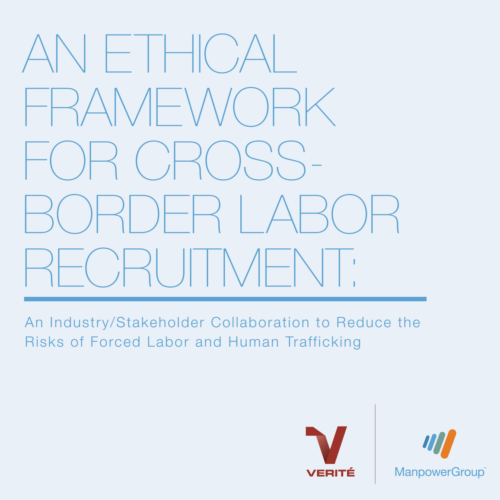 This Framework offers a checklist guide of specific Standards of Ethical Practice for firms involved in cross-border recruitment of workers, and outlines a Verification and Certification System designed to protect workers against specific patterns of vulnerability and abuse. The SEP include: - a checklist of operating rules for firms engaged in the cross-border recruitment and movement of workers The VCS outline includes: - an outline of elements and principles to be adopted by organisations that wish to measure, certify, and ensure compliance of particular enterprises with the SEP The Framework also details a list of recommendations which are informed by ManpowerGroups’s pragmatic experience in responsible cross-border recruitment of workers, and Verite’s expertise in creating verification systems to protect human rights. It is intended as the first phase in a three-phase project, the second phase is a demonstration project with interested groups, the third phase is the development and dissemination of results, assessments, further recommendations and supporting materials for the wider replication and adaptation of the Framework.
This Framework offers a checklist guide of specific Standards of Ethical Practice for firms involved in cross-border recruitment of workers, and outlines a Verification and Certification System designed to protect workers against specific patterns of vulnerability and abuse. The SEP include: - a checklist of operating rules for firms engaged in the cross-border recruitment and movement of workers The VCS outline includes: - an outline of elements and principles to be adopted by organisations that wish to measure, certify, and ensure compliance of particular enterprises with the SEP The Framework also details a list of recommendations which are informed by ManpowerGroups’s pragmatic experience in responsible cross-border recruitment of workers, and Verite’s expertise in creating verification systems to protect human rights. It is intended as the first phase in a three-phase project, the second phase is a demonstration project with interested groups, the third phase is the development and dissemination of results, assessments, further recommendations and supporting materials for the wider replication and adaptation of the Framework. -
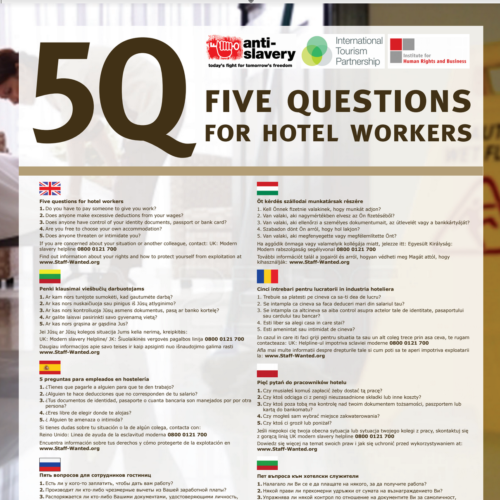 The Staff Wanted Initiative is a collaborative effort from Anti-Slavery International, the UK's only charity dedicated solely to ending modern slavery, and the IHRB, a leading international think tank on business and human rights. The Initiative works to expose and end exploitation of workers in UK hotels. This poster is part of their awareness-raising initiative within the hotel.
The Staff Wanted Initiative is a collaborative effort from Anti-Slavery International, the UK's only charity dedicated solely to ending modern slavery, and the IHRB, a leading international think tank on business and human rights. The Initiative works to expose and end exploitation of workers in UK hotels. This poster is part of their awareness-raising initiative within the hotel.Credit: Staff Wanted Initiative
-
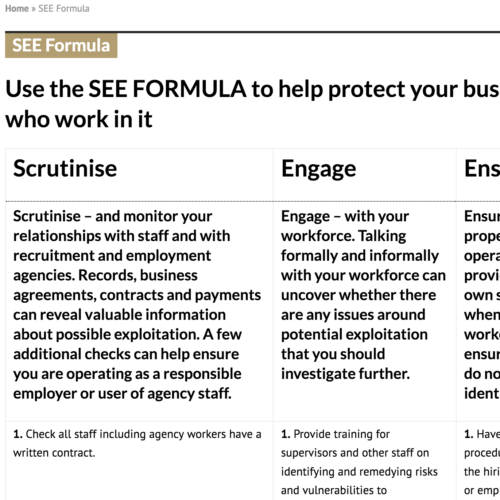 The Staff Wanted Initiative is a collaborative effort from Anti-Slavery International, the UK's only charity dedicated solely to ending modern slavery, and the IHRB, a leading international think tank on business and human rights. The Initiative works to raise awareness and end exploitation of workers in UK hotels. The SEE formula is a three-fold approach to protecting business from labour rights violations - "Scrutinise, Engage, Ensure". It emphasises the need to monitor relationships between and with employees, to communicate informally and formally with workforce, and to provide staff with clear operational procedures when dealing with agency workers.
The Staff Wanted Initiative is a collaborative effort from Anti-Slavery International, the UK's only charity dedicated solely to ending modern slavery, and the IHRB, a leading international think tank on business and human rights. The Initiative works to raise awareness and end exploitation of workers in UK hotels. The SEE formula is a three-fold approach to protecting business from labour rights violations - "Scrutinise, Engage, Ensure". It emphasises the need to monitor relationships between and with employees, to communicate informally and formally with workforce, and to provide staff with clear operational procedures when dealing with agency workers.Credit: Staff Wanted Initiative
-
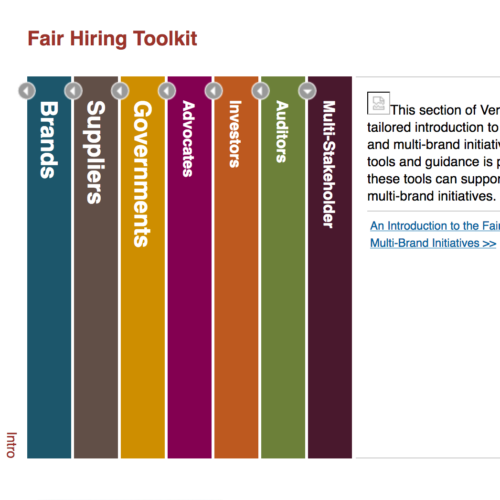 The Fair Hiring Toolkit is a resource which addresses fair hiring practice and responsible recruitment of migrant workers in global supply chains. It focuses on all levels of an organisation to tailor tools and advice appropriately and is a step-by-step process of how to implement trafficking-free supply chains. This includes providing a Framework for Action for brands and suppliers, and supplying guidance for governments, advocates, investors, auditors and other stakeholders. The Frameworks offer advice on: - Improving Codes of Conduct - Raising awareness and building capacity - Strengthening assessments and social audits - Taking corrective action & developing systems improvement plans - Reporting and transparency - Engagement with other actors - Public policy
The Fair Hiring Toolkit is a resource which addresses fair hiring practice and responsible recruitment of migrant workers in global supply chains. It focuses on all levels of an organisation to tailor tools and advice appropriately and is a step-by-step process of how to implement trafficking-free supply chains. This includes providing a Framework for Action for brands and suppliers, and supplying guidance for governments, advocates, investors, auditors and other stakeholders. The Frameworks offer advice on: - Improving Codes of Conduct - Raising awareness and building capacity - Strengthening assessments and social audits - Taking corrective action & developing systems improvement plans - Reporting and transparency - Engagement with other actors - Public policyCredit: Verite
-
 The ILO is a UN organisation responsible for setting and monitoring international labour standards. This ILO paper includes an introduction and background to the context of labour recruitment in a period of increased global mobility, and details existing international and national labour standards to regulate recruitment of workers. It includes examples from the UK.
The ILO is a UN organisation responsible for setting and monitoring international labour standards. This ILO paper includes an introduction and background to the context of labour recruitment in a period of increased global mobility, and details existing international and national labour standards to regulate recruitment of workers. It includes examples from the UK.Credit: International Labour Organisation (ILO)
-
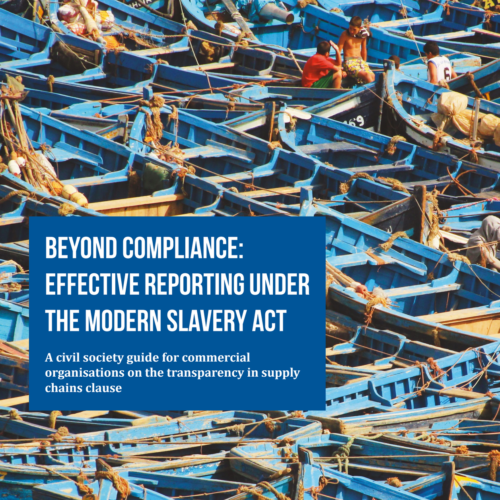 CORE is a civil society coalition on corporate accountability. This is a guide for commercial organisations on Section 54 of the Modern Slavery Act 2015, “Transparency in Supply Chains”. It is intended as a guide to understanding and addressing risks of modern slavery in supply chains, and provides guidance on producing, publishing and reviewing the annual slavery and human trafficking statement required of businesses.
CORE is a civil society coalition on corporate accountability. This is a guide for commercial organisations on Section 54 of the Modern Slavery Act 2015, “Transparency in Supply Chains”. It is intended as a guide to understanding and addressing risks of modern slavery in supply chains, and provides guidance on producing, publishing and reviewing the annual slavery and human trafficking statement required of businesses.Credit: CORE
-
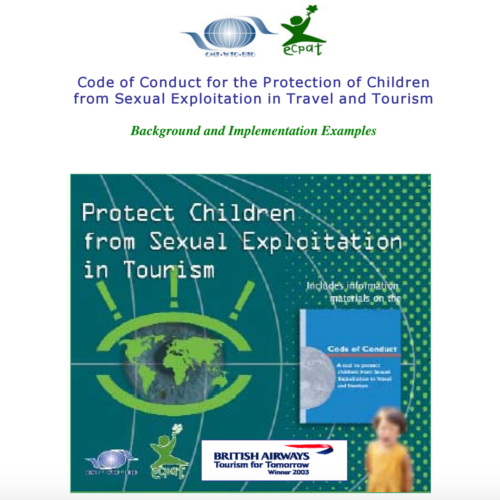 The Code is a project between the tourism private sector and the children’s NGO ECPAT to prevent sexual exploitation of children at tourism destinations. Tour operators and umbrella organisations, hotels, travel agents, airlines who endorse the Code are committed to implement a common set of measures to prevent child exploitation. These include:
The Code is a project between the tourism private sector and the children’s NGO ECPAT to prevent sexual exploitation of children at tourism destinations. Tour operators and umbrella organisations, hotels, travel agents, airlines who endorse the Code are committed to implement a common set of measures to prevent child exploitation. These include:- establishing a corporate ethical policy against commercial exploitation of children
- training in-country personnel in both country of origin and of destination
- providing information to travellers
- providing information to local “key persons” at destinations
- reporting annually
Credit: ECPAT UK
-
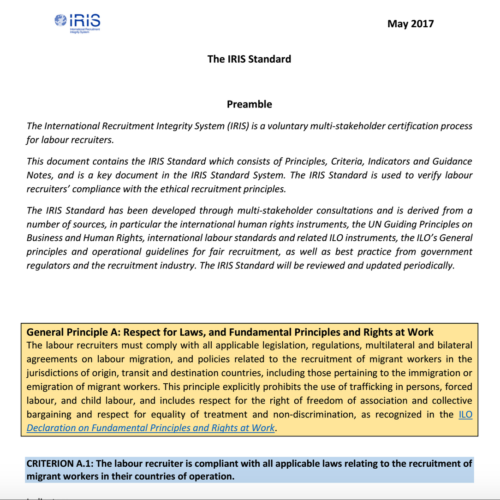 The International Recruitment Integrity System is a voluntary, multi-stakeholder certification system seeking to implement ethical recruitment standards. The Code of Conduct was established by IRIS as part of these efforts. There are 2 General Principles: Respect for Laws, and Fundamental Principles and Rights at Work Respect for Ethical and Professional Conduct It includes 5 Principles:
The International Recruitment Integrity System is a voluntary, multi-stakeholder certification system seeking to implement ethical recruitment standards. The Code of Conduct was established by IRIS as part of these efforts. There are 2 General Principles: Respect for Laws, and Fundamental Principles and Rights at Work Respect for Ethical and Professional Conduct It includes 5 Principles:- prohibition of recruitment fees to jobseekers
- respect for freedom of movement
- respect for transparency of terms and conditions of employment
- respect for confidentiality and data protection
- respect for access to remedy
Credit: International Recruitment Integrity System (IRIS)
-
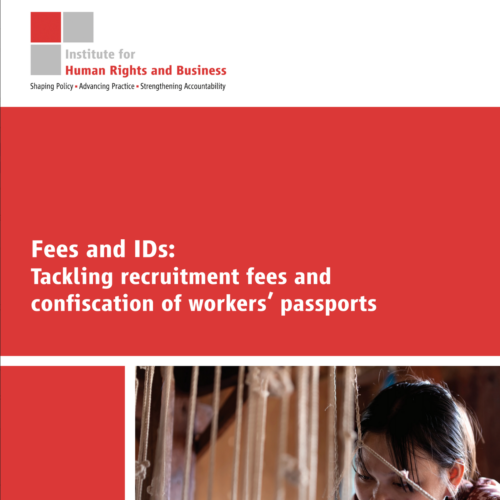 This is a guide produced by the think tank IHRB for tackling the exploitative recruiter practices of charging recruitment fees and confiscation of workers’ practices. The report gives background information regarding the extent of these practices, the current national and international legal frameworks, the business response to the problem and challenges to businesses, and ends with recommendations to businesses.
This is a guide produced by the think tank IHRB for tackling the exploitative recruiter practices of charging recruitment fees and confiscation of workers’ practices. The report gives background information regarding the extent of these practices, the current national and international legal frameworks, the business response to the problem and challenges to businesses, and ends with recommendations to businesses.Credit: Institute for Human Rights and Business (IHRB)
-
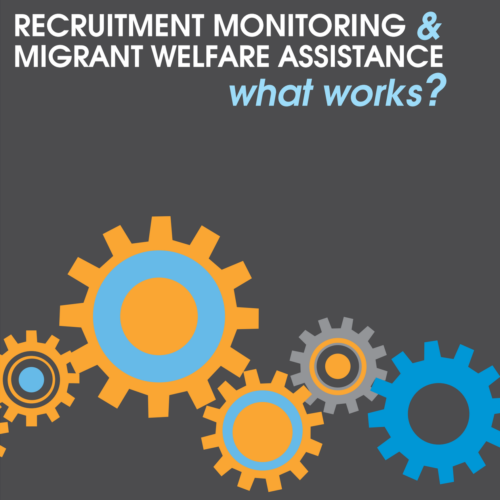 The IOM is a UN organisation providing advice and services to governments and migrants. This report focuses on the migrant welfare assistance currently offered to members of the Colombo Process group in countries of destination. It reviews provisions currently in place to prevent abusive recruitment practices and includes a proposed framework for measuring the effectiveness of recruitment monitoring.
The IOM is a UN organisation providing advice and services to governments and migrants. This report focuses on the migrant welfare assistance currently offered to members of the Colombo Process group in countries of destination. It reviews provisions currently in place to prevent abusive recruitment practices and includes a proposed framework for measuring the effectiveness of recruitment monitoring.Credit: International Organisation for Migration (IOM)
-
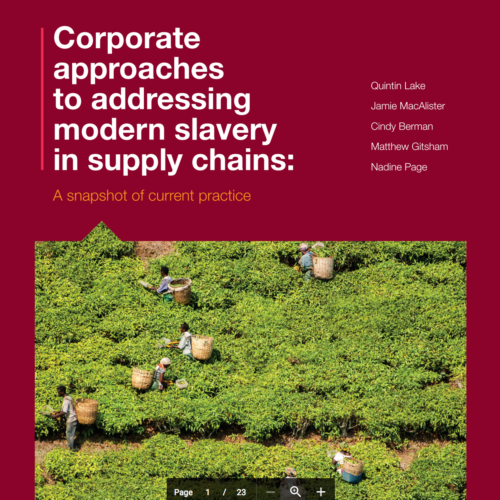 The ETI is an alliance of companies, trade unions and NGOs that promotes workers' rights around the world. This report is the outcome of interviews and surveys with 21 retailers and tier 1 companies across a range of sectors. It is intended to reflect current practice of companies regarding modern slavery and condenses findings into 10 key messages. It is not meant as formal guidance for the industry, but more to provide insight from both ETI and non-ETI members.
The ETI is an alliance of companies, trade unions and NGOs that promotes workers' rights around the world. This report is the outcome of interviews and surveys with 21 retailers and tier 1 companies across a range of sectors. It is intended to reflect current practice of companies regarding modern slavery and condenses findings into 10 key messages. It is not meant as formal guidance for the industry, but more to provide insight from both ETI and non-ETI members.Credit: Ethical Trading Initiative (ETI)
-
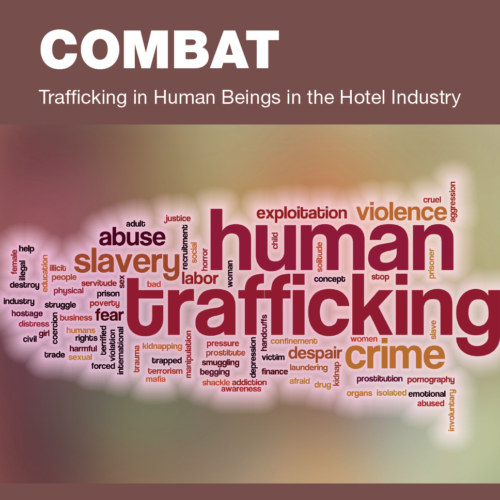 The COMBAT Toolkit is designed specifically to help hotels tackle the problem of human trafficking by helping staff to identify specific signs of trafficking. It comprises reference guides with accompanying powerpoints, case studies with accompanying powerpoint for training sessions, a trainer's manual, a series of 10-minute trainers, aide memoires and example awareness-raising posters. These 10-minute long trainers are designed and tailored as training materials both for those working outside the industry, and for staff working in hotels. Some are department specific such as food and beverage or management, others are more generic. There is also a trainer to educate more generally on how to spot the signs of trafficking in hotels. These are intended for managers and shift leaders to offer as short training at the beginning of shifts, for the trainer to offer as a refresher or as entry into deeper discussion on specific issues.
The COMBAT Toolkit is designed specifically to help hotels tackle the problem of human trafficking by helping staff to identify specific signs of trafficking. It comprises reference guides with accompanying powerpoints, case studies with accompanying powerpoint for training sessions, a trainer's manual, a series of 10-minute trainers, aide memoires and example awareness-raising posters. These 10-minute long trainers are designed and tailored as training materials both for those working outside the industry, and for staff working in hotels. Some are department specific such as food and beverage or management, others are more generic. There is also a trainer to educate more generally on how to spot the signs of trafficking in hotels. These are intended for managers and shift leaders to offer as short training at the beginning of shifts, for the trainer to offer as a refresher or as entry into deeper discussion on specific issues.Credit: COMBAT
Spotting the Signs _________________________________________________________________ For Public Authorities For Corporates For Employees: For Management For Food & Beverage For Front Office For Housekeeping -
 The COMBAT Toolkit is designed specifically to help hotels tackle the problem of human trafficking by helping staff to identify specific signs of trafficking. It comprises reference guides with accompanying powerpoints, case studies with accompanying powerpoint for training sessions, a trainer's manual, a series of 10-minute trainers, aide memoires and example awareness-raising posters. The aide memoire is a physical prompt that can be distributed to all hotel staff and employees, to remind them of the signs of trafficking and how to report it.
The COMBAT Toolkit is designed specifically to help hotels tackle the problem of human trafficking by helping staff to identify specific signs of trafficking. It comprises reference guides with accompanying powerpoints, case studies with accompanying powerpoint for training sessions, a trainer's manual, a series of 10-minute trainers, aide memoires and example awareness-raising posters. The aide memoire is a physical prompt that can be distributed to all hotel staff and employees, to remind them of the signs of trafficking and how to report it.Credit: COMBAT
-
 The COMBAT Toolkit is designed specifically to help hotels tackle the problem of human trafficking by helping staff to identify specific signs of trafficking. It comprises reference guides with accompanying powerpoints, case studies with accompanying powerpoint for training sessions, a trainer's manual, a series of 10-minute trainers, aide memoires and example awareness-raising posters. The following links to reference guides accompanied by slides consist of what different staff members should know about trafficking; it provides the background to human trafficking, and offers practical advice on the development of policies and procedures to counteract and disrupt trafficking and support victims. It offers trainers a ‘pick and mix’ approach so that they can tailor the contents to meet the needs of their training audience.
The COMBAT Toolkit is designed specifically to help hotels tackle the problem of human trafficking by helping staff to identify specific signs of trafficking. It comprises reference guides with accompanying powerpoints, case studies with accompanying powerpoint for training sessions, a trainer's manual, a series of 10-minute trainers, aide memoires and example awareness-raising posters. The following links to reference guides accompanied by slides consist of what different staff members should know about trafficking; it provides the background to human trafficking, and offers practical advice on the development of policies and procedures to counteract and disrupt trafficking and support victims. It offers trainers a ‘pick and mix’ approach so that they can tailor the contents to meet the needs of their training audience.Credit: COMBAT
For Hotel Management For Corporate Boards For Hotel Staff -
 The COMBAT Toolkit is designed specifically to help hotels tackle the problem of human trafficking by helping staff to identify specific signs of trafficking. It comprises reference guides with accompanying powerpoints, case studies with accompanying powerpoint for training sessions, a trainer's manual, a series of 10-minute trainers, aide memoires and example awareness-raising posters. This training manual provides an overview of the Toolkit, and is a supporting document providing guidance on setting training objectives according to participants' level of knowledge, and the time available to participants. With that in mind it emphasises the necessity to tailor your training plan accordingly with guidance on delivery (presentations and materials), questions and answers, group interaction and activities.
The COMBAT Toolkit is designed specifically to help hotels tackle the problem of human trafficking by helping staff to identify specific signs of trafficking. It comprises reference guides with accompanying powerpoints, case studies with accompanying powerpoint for training sessions, a trainer's manual, a series of 10-minute trainers, aide memoires and example awareness-raising posters. This training manual provides an overview of the Toolkit, and is a supporting document providing guidance on setting training objectives according to participants' level of knowledge, and the time available to participants. With that in mind it emphasises the necessity to tailor your training plan accordingly with guidance on delivery (presentations and materials), questions and answers, group interaction and activities.Credit: COMBAT
-
 The COMBAT Toolkit is designed specifically to help hotels tackle the problem of human trafficking by helping staff to identify specific signs of trafficking. It comprises reference guides with accompanying powerpoints, case studies with accompanying powerpoint for training sessions, a trainer's manual, a series of 10-minute trainers, aide memoires and example awareness-raising posters. COMBAT's seven case studies are written in the first person, so that trainees are better able to identify with victims. These case studies are intended to provide discussion point for trainees to identify whether or not the case is an example of human trafficking, what signals there are if so, and what barriers could be erected to prevent this example from happening in their hotel.
The COMBAT Toolkit is designed specifically to help hotels tackle the problem of human trafficking by helping staff to identify specific signs of trafficking. It comprises reference guides with accompanying powerpoints, case studies with accompanying powerpoint for training sessions, a trainer's manual, a series of 10-minute trainers, aide memoires and example awareness-raising posters. COMBAT's seven case studies are written in the first person, so that trainees are better able to identify with victims. These case studies are intended to provide discussion point for trainees to identify whether or not the case is an example of human trafficking, what signals there are if so, and what barriers could be erected to prevent this example from happening in their hotel.Credit: COMBAT

